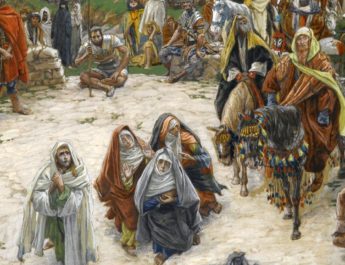Colossians 4:10-17
A Women’s Lectionary – Proper 6
10 AristarchusA my fellow prisonerB greetsC you,
A “Aristarchus” = Aristarchos. 5x in NT. From aristos (best); {from aristeuo (“to be the best)} + archos (leader); {from archo (to rule, begin, have first rank or have political power)}. This is Aristarchus, meaning “best leader” or “best ruling.”
B “fellow prisoner” = sunaichmalotos. 3x in NT. From sun (with, together with) + aichmalotos (a prisoner or captive in war); {from aichme (a spear) + haliskomai (taken or conquered) or halosis (capturing); from haliskomai (see above); from haireomai (to take, choose, or prefer); probably related to airo (raise, take up, lift, remove)}. This is a fellow prisoner or captive.
C “greets” = aspazomai. Perhaps from a (with, together with) + a form of spao (to draw, draw out, pull). This is to welcome, salute, or greet. It can also be to embrace or acclaim.
as does MarkD the cousinE of Barnabas,F
D “Mark” = Markos. 8x in NT. From Latin Marcus (Marcus); {from Mars (the planet or god)} This is Mark of Marcus, a name meaning “dedicated to Mars.” See https://en.wiktionary.org/wiki/Marcus#Latin
E “cousin” = anepsios. 1x in NT. Perhaps from a (with) + nepos (brood). This is a cousin or nephew. It can refer specifically to one’s sister’s son.
F “Barnabas” = Barnabas. Probably from Aramaic Barnabas (Barnabas); {from bar (son) + nabi (prophet, prophecy, speaker; someone inspired)}. This is Barnabas, meaning “son of prophecy” or “representative.” See https://www.abarim-publications.com/Meaning/Barnabas.html#.XsduKmhKhPY
concerning whom you have receivedG instructions;H if he comesI to you, welcomeJ him.
G “received” = lambano. It does not refer to passive receiving of something, but active acceptance or taking of something whether it is offered or simply nearby. It focuses on individual decision and action.
H “instructions” = entole. From entellomai (to charge, command, give orders or instructions) {from en (in, on, at, by, with) + tellomai (to accomplish); {from telos (an end, aim, purpose, completion, end goal, consummation, tax; going through the steps to complete a stage or phase and then moving on to the next one)}}. This is an order, command, ordinance, or law. It focuses on the purpose of the command and its end result.
I “comes” = erchomai. This is to come or go.
J “welcome” = dechomai. This is to warmly receive, be ready for what is offered, take, accept, or welcome. It is to receive in a literal or figurative sense.
11 And JesusK who is calledL JustusM greets you.
K “Jesus” = Iesous. From Hebrew Yehoshua (Joshua, the Lord is salvation); {from YHVH (proper name of the God of Israel; the self-existent and eternal one); {from havah (to become) or from hayah (to come to pass, become, be)} + yasha (to deliver, defend, help, preserve, rescue; properly, to be open, wide or free, which implies being safe. So, in a causative sense, this is to free someone)}. This is Jesus or Joshua in Greek – the Lord saves or the Lord is salvation.
L “called” = lego. This is to speak, say, name, call, command. It is generally to convey verbally.
M “Justus” = Ioustos. 3x in NT. From Latin Justus (Justus); from iustus (righteous, legal, suitable, exact, direct). This is Justus, meaning “just.” See https://www.abarim-publications.com/Meaning/Justus.html & https://en.wiktionary.org/wiki/Justus
These are the onlyN ones of the circumcisionO among my coworkersP
N “only” = monos. Perhaps from meno (to stay, abide, wait, endure). This is alone, single, remaining, mere, desolate.
O “circumcision” = peritome. From peritemno (to circumcise; literally cut around); {from peri (about, concerning, all around, encompassing) + same as tomos or tomoteros (sharp or keener); from temno (to cut as with a single slice)}. This is properly, cut around, referring to the way that foreskin is removed and so this is to circumcise. It can be used or the rite or the people who are circumcised – in a literal or figurative sense.
P “coworkers” = sunergos. 13x in NT. From sun (with, together with) + the base of ergon (work, task, deed, labor, effort) {from ergo (to work, accomplish, do)}. This is co-worker, associate, helper, co-laborer or one’s companion during labor.
for the kingdomQ of God,R and they have beenS a comfortT to me.
Q “kingdom” = basileia. From basileus (king, emperor, sovereign); probably from basis (step, hence foot; a pace); from baino (to walk, to go). This is kingdom, rule, authority, sovereignty, royalty, a realm.
R “God” = Theos. From Proto-Indo-European origins, meaning do, put, place. This is God or a god in general.
S “been” = ginomai. This is to come into being, to happen, become, be born. It can be to emerge from one state or condition to another or is coming into being with the sense of movement or growth.
T “comfort” = paregoria. 1x in NT. From paregoreo (to address) OR from para (beside, by, in the presence of) + agora (assembly, forum, marketplace, town square, thoroughfare); {from ageiro (to gather)}. This is comfort, encouragement, addressing alongside. It is comfort that soothes pain.
12 Epaphras,U who is one of you, a servantV of Christ,W, X greets you.
U “Epaphras” = Epaphras. 3x in NT. From Epaphroditos (Epaphroditus; “dedicated to Aphrodite” or “very foamy” or “very lovely”); {from epi (on, upon, against, what is fitting) + Aphrodite (Aphrodite, Venus) or from aphros (foam)}. This is Epaphras or Epaphroditus. This is “very foamy” or “very lovely” or “dedicated to Aphrodite” or “dedicated to love and beauty.” See https://www.abarim-publications.com/Meaning/Epaphras.html
V “servant” = doulos. Perhaps from deo (to tie, bind, fasten, impel, compel; to declare something against the law or prohibited). This is used for a servant or for a slave, enslaved. It refers to someone who belongs to someone else. But, it could be voluntary (choosing to be enslaved to pay off debt) or involuntary (captured in war and enslaved). It is used as a metaphor for serving Christ. Slavery was not inherited (i.e. the children of slaves were not assumed to be slaves) and slaves could buy their way to freedom. Slavery was generally on a contractual basis (that is for the duration of how long it took you to pay your debt and/or save up enough money to buy your freedom).
W “Christ” = Christos. From chrio (consecrate by anointing with oil; often done for prophets, priests, or kings). Literally, the anointed one, Christ. The Greek word for Messiah.
X {untranslated} = Iesous. Same as “Jesus” in v11. See note K above.
He is alwaysY strivingZ in his prayersAA on your behalf,
Y “always” = pantote. From pas (all, every, each) + tote (then, whether past or future); {from hote (when); from ho (the)}. This is literally every when. It is always, at all times.
Z “striving” = agonizomai. 8x in NT. From agon (a gathering or contest – as an athletic competition such as a race; also conflict, struggle, opposition or a fight; used figuratively in a positive sense – as fighting the good fight of faith; used in a negative figurative sense for effort or anxiety; properly, refers to a place where people gather, which implies the game or contest); from ago (lead, bring, carry, drive, go). This is to struggle, strive, or fight. It could be contending to win a prize or against an adversary or in war. It can also mean striving to accomplish something. This is where the word “agonize” comes from.
AA “prayers” = proseuche. From proseuchomai (to pray or pray for, to worship or supplicate; more literally exchanging one’s own wishes for God’s); {from pros (advantageous for, at, toward) + euchomai (to wish, make a request, pray)}. This is prayer, worship, or a place where one prays.
so that you may standBB matureCC and fully assuredDD in everythingEE that God wills.FF
BB “stand” = histemi. This is to stand, place, establish, appoint, stand ready, be steadfast.
CC “mature” = teleios. Related to “instructions” in v10. 19x in NT. From telos (see note H above). This is going through the steps to complete a stage or phase and then moving on to the next one. This is reaching an end and so being complete or “perfect.” It is also full grown or mature.
DD “fully assured” = plerophoreo. 6x in NT. From pleres (to be full, complete, abounding in, or occupied with); {from pletho (to fill, accomplish, supply; to fill to maximum capacity)} + phoreo (to bear constantly or habitually or repeatedly; it can mean to wear or carry a burden); {from phero (to bear, bring, lead, make known publicly; to carry in a literal or figurative sense)}. This is to fulfills, fully convince, satisfy, accomplish, fully assure. It can be to fully convince by using evidence or to make full.
EE “everything” = pas. Related to “always” in v12. See note Y above.
FF “wills” = thelema. From thelo (to desire, wise, will, intend). This is the act of will, choice, purpose, or decree.
13 For I testifyGG for him that he has worked hardHH for you and for those in LaodiceaII and in Hierapolis.JJ
GG “testify” = martureo. From martus (a witness whether having heard or seen something; witness literally, judicially, or figuratively; by analogy, a martyr). This is to bear witness, testify, give evidence. It is to testify in a literal or figurative sense.
HH “has worked hard” = echo + polus + ponos. Literally, “has great concern.” Echo is have, hold, possess. Polus is much, often, plenteous – a large number or a great extent. Ponos is 4x in NT– 1x in Colossians & 3x in Revelation. From the base of penes (a laborer, poor person, starving or indigent person; someone who works for their living); from pernomai (working for a living; laborer, poor person; to work for daily bread); from peno (to toil to survive day by day). This is labor, anguish, suffering, pain.
II “Laodicea” = Laodikeia. 5x in NT. From laos (people, crowd, the chosen people) + dike (the principle of justice; that which is right in a way that is very clear; a decision or the execution of that decision; originally, this word was for custom or usage; evolved to include the process of law, judicial hearing, execution of sentence, penalty, and even vengeance; more commonly, it refers to what is right); {may be from deiknumi (to show, point out, exhibit; figurative for teach, demonstrate, make known)}. This is Laodicea, meaning “place of people of common fairness.” See https://www.abarim-publications.com/Meaning/Laodicea.html
JJ “Hierapolis” = Hieros + polis. Hieros is 4x in NT. This is sacred, something sacred, temple, holy, set apart. It is something consecrated to God or a god. Polis is a city or its inhabitants. It is a town of variable size, but one that has walls. This is where “metropolis” and “police” come from.
14 Luke,KK the belovedLL physician,MM and DemasNN greet you.
KK “Luke” = Loukas. 3x in NT. From Latin Lucanus (Lucanus); from lux (light, day). This is Luke or Lucas, meaning “light” or “of light” or “of the day.” See https://www.abarim-publications.com/Meaning/Luke.html
LL “beloved” = agapetos. From agape (love, goodwill, benevolence; God’s divine love); from agapao (to love, take pleasure in, esteem; to prefer). This is Beloved or very dear one. It is a title for the Messiah, but also for Christians. Properly, this is one who personally experiences God’s love.
MM “physician” = iatros. 7x in NT. From iaomai (to heal, particularly from a physical illness, or a spiritual difficulty; to cure or make whole in a literal or figurative sense). This is healer i.e. physician.
NN “Demas” = Demas. 3x in NT. May be contracted from Demetrios (Demetrius); {From Demetrios (belonging to Demeter); from Demeter (goddess of agriculture); {from ge (land, soil) + meter (mother, origin)}} OR from demos (country, people). This is Demas, meaning “popular” or “the common people” or “belonging to Demeter.” See https://en.wiktionary.org/wiki/Demetrius & https://www.abarim-publications.com/Meaning/Demas.html
15 Give my greetingsOO to the brothersPP and sisters in Laodicea and to NymphaQQ and the churchRR in her house.SS
OO “give…greetings” = aspazomai. Same as “greets” in v10. See note C above.
PP “brothers” = adelphos. From a (with, community, fellowship) + delphus (womb). This is a brother in a literal or figurative sense. It is also used of another member of the Church.
QQ “Nympha” = Numpha. 1x in NT. From numphe (bride, daughter-in-law, young wife, or young woman); {perhaps from nupto (to put on a veil as a bride does – in Latin nupto means simply to marry); related to numphon (the room where the marriage bed is)} OR from numphe (see above) + doron (gift, offering, sacrifice; emphasizes that the gift is given freely, voluntarily); {from didomi (to give in a literal or figurative sense)}. This is Nympha or Nymphas, meaning “nymph-given” or “bride.” See https://www.abarim-publications.com/Meaning/Nympha.html
RR “church” = ekklesia. From ek (from, out from) + kaleo (to call by name, invite, to name, bid, summon, call aloud) {related to keleuo (to command, order, direct); from kelomai (to urge on)}. This is properly a calling out or an assembly. It was used to refer to a church.
SS “house” = oikos. This is house – the building, the household, the family, descendants, the temple.
16 And when this letterTT has been readUU among you, haveVV it read also in the church of the Laodiceans,WW and see that you read also the letter from Laodicea.
TT “letter” = epistole. Related to “stand” in v12. From epistello (to write, communicate through letter); {from epi (on, upon, against, what is fitting) + stello (to send, set, arrange, prepare, gather up); {from histemi (see note BB above)}}. This is an epistle, letter, or other written message. This is where the word “epistle” comes from.
UU “read” = anaginosko. From ana (upwards, up, again, back, anew) + ginosko (know, recognize, learn from firsthand experience). This is literally to know again – to recognize, read, or discern.
VV “have” = poieo. This is to make, do, act, construct, abide, or cause.
WW “Laodiceans” = Laodikeus. Related to “Laodicea” in v13. 1x in NT. From Laodikeia (see note II above). This is inhabitant of Laodicea – “place of people of common fairness.” See https://www.abarim-publications.com/Meaning/Laodicea.html
17 And say to Archippus,XX “SeeYY that you completeZZ
XX “Archippus” = Archippos. Related to “Aristarchus” in v10. 2x in NT. From archo (see note A above) + hippos (horse). This is Archippus, meaning “horse-ruler.”
YY “see” = blepo. This is literally to see – it is primarily used in the physical sense. However, figuratively it can be seeing, which includes attention and so to watchfulness, being observant, perceiving, and acting on the visual information. It can also mean beware.
ZZ “complete” = pleroo. Related to “fully assured” in v12. From pleres (see note DD above). This is to fill, make full or complete. Properly, this is filling something up to the maximum extent that it can be filled – an appropriate amount for its individual capacity. So, this is used figuratively for furnish, influence, satisfy, finish, preach, perfect, and fulfill.
the taskAAA that you have receivedBBB in the Lord.”CCC
AAA “task” = diakonia. Perhaps from dia (through, across to the other side, thoroughly) + konis (dust) OR from dioko (to chase after, put to flight; by implication, to persecute or to purse like a hunter after its prey; this can be earnestly pursue or zealously persecute) {related to dio (put to flight)}. This is service, ministry, attending someone, service. It can mean serving someone at a table or otherwise as their servant/slave. It is also used for people who serve/minister in temples, as well as the work of Christian ministry. Figuratively, this word can mean money given for charity. This shares a root with “deacon” and is where the word “diaconate” comes from.
BBB “received” = paralambano. Related to “received” in v10. From para (beside, by, in the presence of) + lambano (see note G above). This is to receive, take, acknowledge, associate with. It can also mean to take on an office or to learn.
CCC “Lord” = Kurios. From kuros (authority, supremacy). This is a respectful address meaning master or sir. It refers to one who has control or power greater than one’s own. So, it was also applied to God and Jesus as Master or Lord.
Image credit: “Saint Basil the Great” at the Savior-Euphrosyne convent in Polatsk, 12th century.




